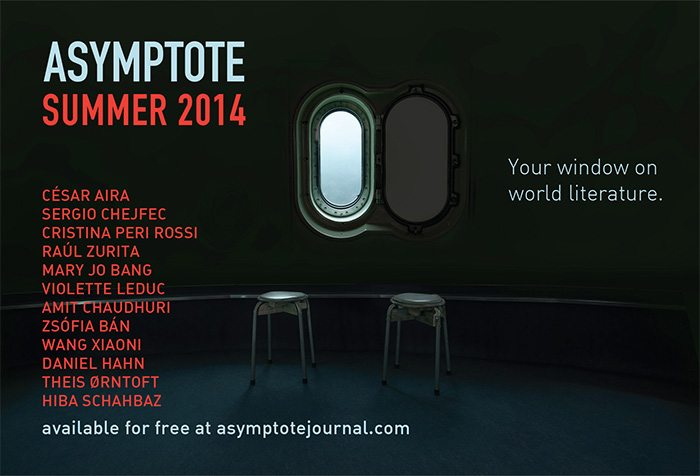Hot off the e-press: Asymptote’s July issue is now live! The star-studded issue reads like a cool glass of water, and with good reason: the cold-as-ice cover is inspired by Latin America, currently in the dead of winter and the subject of this issue’s special feature.
Highlights in this Latin-American edition include writerly tributes to Osvaldo Lamborghini (by César Aira), Julio Cortázar (by Sergio Chejfec), and Gabriel García Márquez (by the legend’s very own Portuguese translator Eric Nepomuceno), alongside poetry from Chilean prizewinner Rául Zurita and fiction by Uruguayan author Cristina Peri Rossi. We’ve even got a video trailer for them!
And also worth perusing on a hot summer day:
– An excerpt from Violette Leduc’s at-long-last-uncensored 1954 novel, championed by Simone de Beauvoir (especially interesting given Martin Provost’s latest biopic, Violette);
– Fiction by the 2013 European Union Prize for Literature Winner (and blog alum!) Faruk Šehić, accompanied by a video of the author reading his work;
– Japanese surrealist poetry newly translated by Yuki Tanaka & Mary Jo Bang (who recently translated Dante’s Inferno);
– Translators writing essays about translating: Daniel Hahn and J. T. Lichtenstein;
– Reviews of Qiu Miaojin’s Last Words from Montmartre, David Damrosch’s World Literature in Theory, and Barbara Cassin’s Dictionary of Untranslatables: A Philosophical Lexicon;
– Our first work from Djibouti (and much more)!
It’s hard to pick favorites in any issue as jam-packed as this—and we’ve really only skimmed the surface—but you know that already. So we won’t bore you with modifiers or absolutes, and simply nudge you toward some of the issue’s (many) standouts: pieces that really spoke to us (that is to say, blog co-editors Patty and Eva) in this particular moment.
Patty: Read our selections from The Country of Ice by Chilean poet Raúl Zurita (translated by Daniel Borzutzky) right now. Zurita’s work is notoriously and magnificently expansive in scope, literally: using aircraft and earth-moving equipment, his poems occupy physical space so magnificently that they’re impossible to grasp without an equal-and-opposite distancing or miniaturizing device. Each ode begins with the same phrase, and the ensuing poem catapults to dizzying globality and strange, defamiliarizing particularity and closeness.
After recovering your breath, do yourself a favor and read Hungarian writer Zsófia Bán’s fiction piece On the Eve of No Return, translated by Jim Tucker. This piece is the sort of thing I’d give to friends who don’t read much translated literature, because it’s an easy argument in favor of reading more translated writings: anglocentric reading just doesn’t cut it when you’re talking about the U.S.S.R. Bán’s piece takes an imaginative turn, written from Laika’s perspective, the U.S.S.R’s doomed space dog. It manages to be topical and humorous while still formally compelling, prodding mortality and technology in the most intimate ways.
Eva: When you’ve finished mourning dear Laika (who didn’t have to die) and combing your local animal shelters for husky-terriers who look like Laika (none of them will fill the hole left in your heart), check out Mui Poopoksakul’s thoughts on contemporary Thai fiction. She writes a compelling and vivid portrait of a short-story-dominated literary scene that “request[s]—even breed[s]—astute readers who bring in their own interpretations, question what they read, and perceive the multiplicity of meanings.” And from Mexico, author Julián Herbert and translator Annie McDermott bring us a naturalistic, surprising, and remarkable tale of a man’s dying mother, of narcotraffickers and Ron Mueck heads, and of melodrama and restaurant waiters, which also calls for readers like you to bring your own interpretations, your own questions and meanings. So please do!

